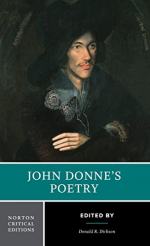|
This section contains 253 words (approx. 1 page at 400 words per page) |

|
The Triple Fool Summary & Study Guide Description
The Triple Fool Summary & Study Guide includes comprehensive information and analysis to help you understand the book. This study guide contains the following sections:
This detailed literature summary also contains Quotes and a Free Quiz on The Triple Fool by John Donne.
The following version of this poem was used to create this guide: Donne, John. “The Triple Fool.” Representative Poetry Online. https://rpo.library.utoronto.ca/content/triple-fool
Note that all parenthetical citations within the guide refer to the lines of the poem from which the quotations are taken.
John Donne was born into a Catholic family in the early 1570s, at a time when the practice of Catholicism was illegal in England. Donne's father died when he was only four, leaving his mother to raise him and his siblings alone. He studied at Oxford and Cambridge from a young age, though he was not allowed to graduate due to his religion. Donne spent much of his inheritance on travel as a young man, and then secretly married Anne More. Her father's objections led to a period of poverty for the couple, and Donne was even briefly imprisoned. Anne died giving birth to their twelfth child, leading to a period of profound depression during which Donne contemplated suicide. Donne also began questioning his Catholic faith, and eventually joined the Church of England and even spoke out against Catholicism. He was then able to become a member of parliament and, eventually, Dean of St. Paul's. He died in 1631, having authored many poems on the themes of desire, love, and faith.
"The Triple Fool" was written during one of Donne's periods of depression. In the poem, he uses the character of "the fool" to explore the divisions created by art and grief.
Read more from the Study Guide
|
This section contains 253 words (approx. 1 page at 400 words per page) |

|



